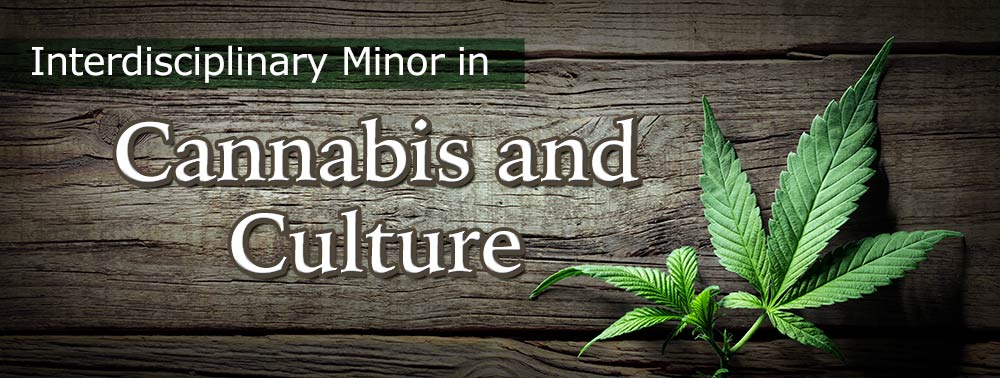Academics

Interdisciplinary Minor in Cannabis & Culture
"Cannabis helps produce the serenity and insight, sensitivity and fellowship so desperately needed in this increasingly mad and dangerous world." ~ Carl Sagan, Ph.D., American astronomer and astrophysicist
The interdisciplinary minor in Cannabis & Culture offers students a foundation for understanding the socio-cultural, historical, and politics of cannabis use in the United States and around the globe. As a result of the swift growth in medical and recreational cannabis in Illinois, Western Illinois University students may find the cannabis industry an attractive one to enter after graduation. The minor will expose students to some of the types of employment they might pursue. The minor in Cannabis & Culture, as an interdisciplinary minor, will provide WIU students with the recognition of complex historical, cultural, and social/political/economic contexts.
This minor will offer all students an inclusive experience, drawing on a variety of backgrounds and modes of understanding, in addition to emphasizing how societal structures have affected drug legislation, business ownerships, and the current and future challenges anyone entering this industry is likely to face.
Distinctive Features
Faculty and students of the Cannabis & Culture Minor at Western Illinois University, strongly condemn the continued state-sanctioned violence against Black Americans and the racist and white supremacist rhetoric that endorses it, as exemplified by the killings of George Floyd, Ahmaud Arbery, Breonna Taylor, and countless others. We stand in solidarity with the protesters and others who seek an end to these long-standing injustices and against those who seek to divide and incite hatred in our communities. In our teaching, research, mentoring, and service to WIU and its broader community, the Cannabis & Culture Minor is working to identify and dismantle deeply embedded structures of anti-Black racism.
For decades, the prohibition against cannabis has devastated the lives of millions and disrupted the economic and social fabric of communities. The racialized enforcement of cannabis prohibition laws results in over 600,000 arrests annually, disproportionately impacting people of color who are on average almost 4 times more likely to be arrested for cannabis possession than their white counterparts, despite equal rates of use across race [i] . Additionally, cannabis was the fourth most common cause of deportation for any offense and the most common cause of deportation for drug law violations [ii] .
Individuals who have suffered from the impact of a cannabis arrest or conviction are still languishing from the thousands of unique collateral consequences of over-enforcement of cannabis laws—collateral consequences that include difficulty securing or maintaining employment, housing, federal financial aid, nutritional assistance, the ability to vote, a valid driver’s license, and harsh immigration-related consequences for noncitizens [iii] .
As social scientists and humanists, we understand that current regulations related to cannabis must be examined in the context of deep structural racism persisting throughout our history. We are committed to building a rigorous and inclusive environment that honors the rights and voices of marginalized communities and nourishes the human diversity that is at the heart of our discipline.
The Cannabis & Culture Minor at WIU supports the work of the elected officials The Four Women Who Crafted Illinois' Cannabis Proposal, Last Prisoner Project, and the work of the National Cannabis Industry in advancing social justice issues.
- [i] Federal Bureau of Investigations: Uniformed Crime Reporting. “2017 Crime in the United States.” https://ucr.fbi.gov/crime-in-the-u.s/2017/crime-in-the-u.s.-2017/topic-pages/persons-arrested; American Civil Liberties Union. Report: The War on Marijuana in Black and White. June 2013. https://www.aclu.org/report/report-war-marijuana-black-and-white
- [ii] Drug Policy Alliance. The Drug War and Mass Deportation. February 2016. https://www.drugpolicy.org/sites/default/files
- [iii] Berson, Sarah. National Institute of Justice. “Beyond the Sentence – Understanding Collateral Consequences.” https://www.nij.gov/journals/272/Pages/collateral-consequences.aspx
WIU is the only University in Illinois to offer this program. The minor in Cannabis & Culture is a distinctive one in the state of Illinois, as no other public or private institution in the state offers a minor of this type that addresses issues specifically related to the cultural use of cannabis and the culture of the cannabis industry.
- Courses are available in the classroom, online, or in a combination of both formats.
- As an interdisciplinary minor the Cannabis & Culture minor exposes students to a diverse group of faculty members in the humanities and socia sciences and the theoretical and methodological approaches that their disciplines use to approach the study of cannabis.
- Student Organizations – Western Anthropology & Sociology Club (WASC) and LAS Student Organization (LASSO) are comprised of undergraduate and graduate students and faculty advisers. The groups sponsor speakers and events relating to diversity issues, culture, sustainability and environmental awareness and the social side of education, medicine, politics and many other subjects.
- Special Opportunities – our faculty have established connections with those involved and invested in the cannabis industry in Illinois.
 Possible Career Fields
Possible Career Fields
- Cannabis Industry jobs:
- food & beverage industry
- dispensary employee
- grow facility employees
- Advocacy & social justice
- Law Enforcement & justice
- Politics and public policy
- Social work
Program of Study
Interdisciplinary Minor in Cannabis & Culture requirements: Total of 18 SH
I. Core Courses: 9 SH
- ANTH 180 – Cannabis Culture: Anthropological Study of Cannabis (3 SH)
- REL 180 – Religion & Drugs (3 SH)
- LAS 420 – Senior Seminar in Cannabis & Culture (3 SH)
II. Directed Electives: 9 SH with at least 3 SH at the 300- or 400-level. Beyond 9 SH count as open electives. No more than two courses in one department.
- PHIL 120 – Contemporary Moral Problems (3 SH)
- ANTH 210 – Medical Anthropology (3 SH)
- ANTH/REL 324 – Religion, Magic & Shamanism (3 SH)
- ANTH 333 – From Magic Mushrooms to Big Pharma (3 SH)
- ENG 363 - Cannabis & Popular Culture
- HIST 385 – History of Drugs (3 SH)
- POLS 302 – Introduction to Public Policy (3 SH)
- POLS 400 – Comparative Public Policy (3 SH)
- ANTH/BOT 463 – Ethnobotany (4 SH)
Study Abroad: Cannabis & Culture in Amsterdam
The Netherlands has a history with cannabis dating back to the 1920s, when the plant was legal in their colonies. From then to now, there have been various levels of legality and permissiveness in the use of cannabis in the country. Dutch coffeeshops, businesses where the purchase of marijuana is allowed, started appearing in Amsterdam in the 1970s.
The culture of these shops is changing as more and more people visit Amsterdam for cannabis-related tourism and are disrespectful of the cannabis consumption culture in the Netherlands. Explore how American culture and attitudes related to cannabis consumption may also change over time as legalization of cannabis becomes more widespread in the US. Contact Dr. Heather McIlvaine-Newsad for more information. Learn more about study abroad programs.
History of the Minor
News
- Tri-States Public Radio/NPR: 7/9/2021
- Peoria Journal Star: 2/22/2020
- Quad City Times: 2/19/2020
- News release 2/19/2020
Commentary & Presentations
Contact Information
For program specific questions, please contact:
Dr. Heather McIlvaine-Newsad
Department of Sociology and Anthropology
Morgan Hall 408
Western Illinois University
Phone: (309) 298-1056
Email: h-mcilvaine-newsad@wiu.edu

Connect with us: